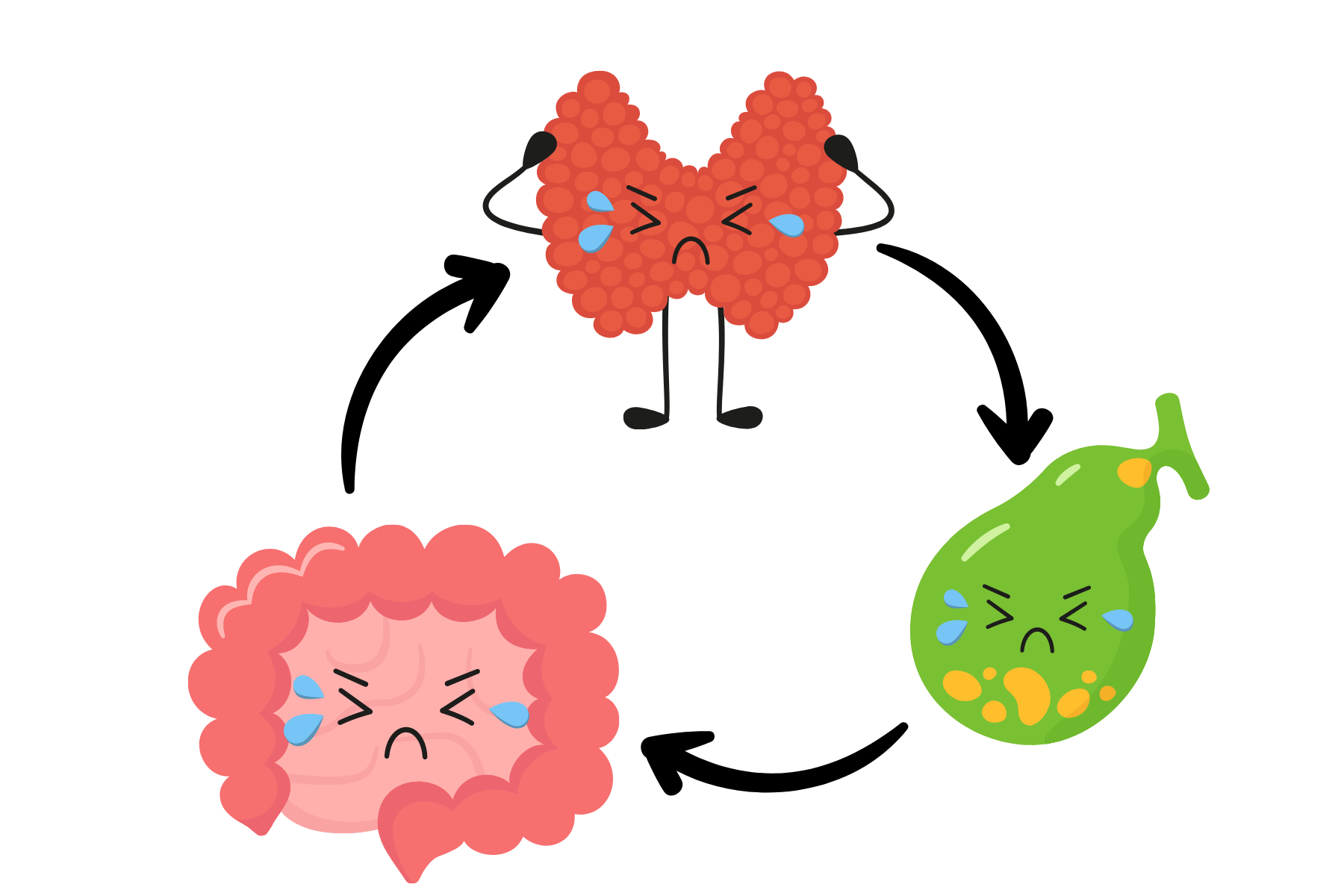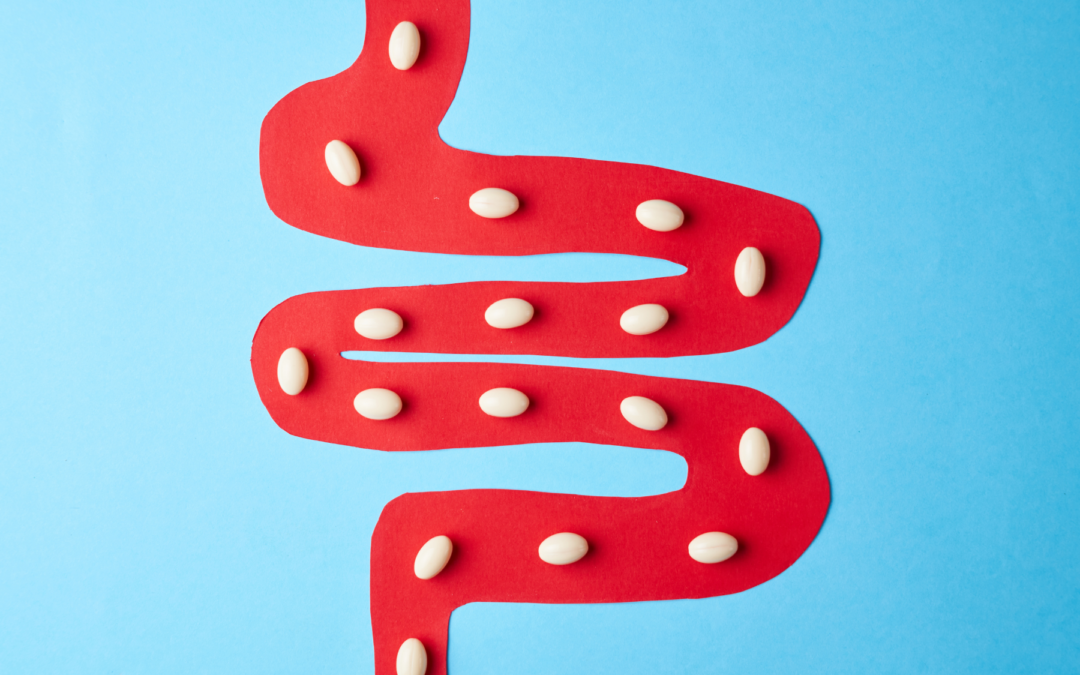Hypothyroidism occurs when the body attacks the thyroid gland. This results in lower production of thyroid hormones, which then has repercussions on nearly everything else in the body. Hypothyroidism and other autoimmune conditions are more common in women than men.
We’ve been taught that autoimmune disorders stem from unknown causes for many years. Some guess that women develop autoimmune disorders more often than men due to higher levels of hormones, especially in their younger years.
However, more recent studies hypothesize that autoimmune disorders (including thyroid disorders) stem from poor gut health.
What’s the link between the thyroid and the gut?
The thyroid gland – a butterfly-shaped gland in the neck – is responsible for key roles in the body. These include the ability to conceive, stomach acid production, saliva production, sleep patterns, mental health, energy levels, and how well we digest, metabolism, distribute, and absorb nutrients from food.
The thyroid hormones thyroxine (T4) and triiodothyronine (T3) are what set your basal metabolic rate. The basal metabolic rate is the speed at which your body burns energy/calories to do biological functions throughout the entire body. This is partially why those with hypothyroidism have difficulty losing weight.
A typical doctor’s approach to treating this condition is prescribing levothyroxine – a thyroid hormone replacement to regulate energy metabolism. This initially reduces symptoms but does not combat the root issues that may lie in the gut…
Many studies show that thyroid and digestive issues often occur together. We have seen this a lot here at AZ Dietitians as well. Gastrointestinal (GI) symptoms of thyroid disorders can include heartburn, reduced stomach acid production, gas, bloating, diarrhea, constipation, gall bladder complaints, nausea, indigestion, and general digestive problems such as IBS.
What we mean is that the thyroid can influence the health of the gut. Although, the gut can also influence the thyroid! It’s a bit of the chicken and the egg situation. We know that the gut microbiome (the bacteria living in the gut) impacts thyroid function, and we’re taking an educated guess that it impacts the thyroid by first affecting the immune system (since hypothyroidism is an autoimmune disorder).
How is the gut tied to autoimmunity?
There is a strong tie between gut health and autoimmunity. A large portion of the body’s immune system is located in the gut, and the gut barrier is an easy place for damage to occur because it’s where foods, chemicals, and toxins produced by bacteria flow through the body. The intestinal damage can allow these toxins and antigens to pass through the gut barrier into the body’s circulation. These then wreak havoc in the body as the body tries to fight them off.
Studies have shown that changes in the gut microbiome, such as dysbiosis (an imbalance of good and bad bacteria), can cause autoimmune thyroid disorders (4). Specific compositions of bacteria are even linked to certain thyroid disorders (5).
In fact, one small study showed that 54% of patients with hypothyroidism tested positive for Small Intestinal Bacterial Overgrowth (SIBO) compared to healthy controls (6). This could be because the thyroid hormones partially control how quickly food moves through the intestines. If food is not moving through at the right rate, it becomes a feasting ground for bacteria to overpopulate in the intestines.
Another interesting tie between the gut and the thyroid is Celiac disease. Celiac disease is also an autoimmune disorder in which a person experiences intestinal damage from eating gluten found in wheat, barley, and rye. It is common for people with Hashimoto’s and Graves also to have Celiac disease or Non-celiac wheat sensitivity (1, 2). In fact, compared to the general population, patients with autoimmune thyroiditis have a near 5-fold higher risk of developing celiac disease (3)!
Studies also show that up to 43% of patients with Hashimoto’s have cellular markers for celiac disease. Thyroid diseases are often diagnosed before celiac disease – is that to say that thyroid disorders develop first and celiac disease second? Not necessarily, since thyroid disorders are more commonly tested for than celiac disease. Either way, we can see there’s a tie between the two.
How the gut affects the thyroid
The gut is where we digest and absorb nutrients. Some key nutrients for proper thyroid function include iodine, selenium, zinc, iron, vitamin A, B vitamins, and tyrosine (an amino acid). We often see deficiencies in these nutrients in those with autoimmune thyroid disorders (1).
Why might we be seeing these deficiencies? The composition of gut bacteria (the microbiome) is what affects the body’s ability to break down and absorb these nutrients. The microbiota also influences the conversion of T4 to T3; T3 is the active form of T4 (7). This is likely because selenium and zinc are required to convert T4 to T3. Basically, if you’re running low on those nutrients, you will run low on active T3.
The enzymes that convert T4 to T3 are called deiodinase enzymes. This enzyme activity has been found to occur in the intestinal walls (1). Plus, animal studies show that gut bacteria can bind thyroid hormones, thus being a potential cause of lowered thyroid hormone levels (8).
Does the gallbladder have anything to do with the gut-thyroid connection?
Another interesting piece of the gut-thyroid puzzle is the gallbladder. (We can’t even tell you how often we see patients that have thyroid issues, gut issues, and have had their gallbladder removed. Is this you?)
The gallbladder stores bile acids that are then secreted into the intestines to break down fats so we can absorb them. When this process happens, the bacteria in the gut metabolize the bile acids into secondary bile acids, which increase the activity of the deiodinase enzymes to convert more T4 to T3 (9). Selenium is a mineral that is an essential component of these deiodinase enzymes so that they can properly do their jobs (10).
Hypothyroidism has been shown to slow bile flow from the gallbladder, thus affecting the conversion of T4 to T3 (11). This may partly explain why it is common to see gallstones in those with hypothyroidism (11). At least one study has shown a link between thyroid disorders and gallstone formation (12).
Another reason that impeded bile flow is also an issue for thyroid disorders and gut health is that bile is naturally antimicrobial. If the amount of bile is reduced, the body is more at risk for an overgrowth of bacteria (SIBO).
Diet & Lab Testing Recommendations
So, from the research, we’ve gathered that an unhealthy gut makes an unhealthy thyroid (and vice versa), which then affects the gallbladder and nutrient absorption and conversion of T4/T3. It’s not a pretty picture.
If you suspect that your gut and thyroid are off balance, we recommend having a full thyroid panel drawn. It’s also a great idea to be tested for SIBO with the hydrogen breath tests. We can also order a test called the Gut Zoomer through Vibrant Wellness to assess your gut balance, including the microbiome, pathogens, secondary bile metabolites, and so much more. Once we know what is going on, we can help you implement the right diet to address the root cause of your issues!
In general, it’s recommended for anyone with a thyroid disorder to eat nutrient-dense foods high in selenium, zinc, B vitamins, vitamin A, iron, and omega 3s, since these nutrients are often depleted. It’s also a great idea to cut back on refined, processed foods, and gluten. Gluten is a common food trigger for gut and thyroid problems, so it’s best to eliminate it.
If you’d like a customized plan to help you regain your health, reach out to us!
References:
- https://www.ncbi.nlm.nih.gov/pmc/articles/PMC7353203/pdf/nutrients-12-01769.pdf
- https://pubmed.ncbi.nlm.nih.gov/32190224/
- https://www.ncbi.nlm.nih.gov/pmc/articles/PMC2699000/
- https://pubmed.ncbi.nlm.nih.gov/30294759/
- https://pubmed.ncbi.nlm.nih.gov/31257166/
- https://academic.oup.com/jcem/article/92/11/4180/2598186?login=false
- https://www.sciencedirect.com/science/article/abs/pii/S0303720717300758?via%3Dihub
- https://pubmed.ncbi.nlm.nih.gov/8214060/
- https://www.nature.com/articles/nature04330
- https://pubmed.ncbi.nlm.nih.gov/8427195/
- https://pubmed.ncbi.nlm.nih.gov/12660641/
- https://www.ncbi.nlm.nih.gov/pmc/articles/PMC4320366/







